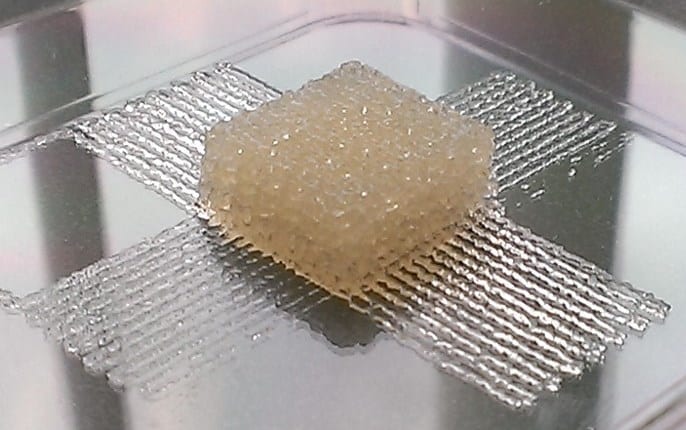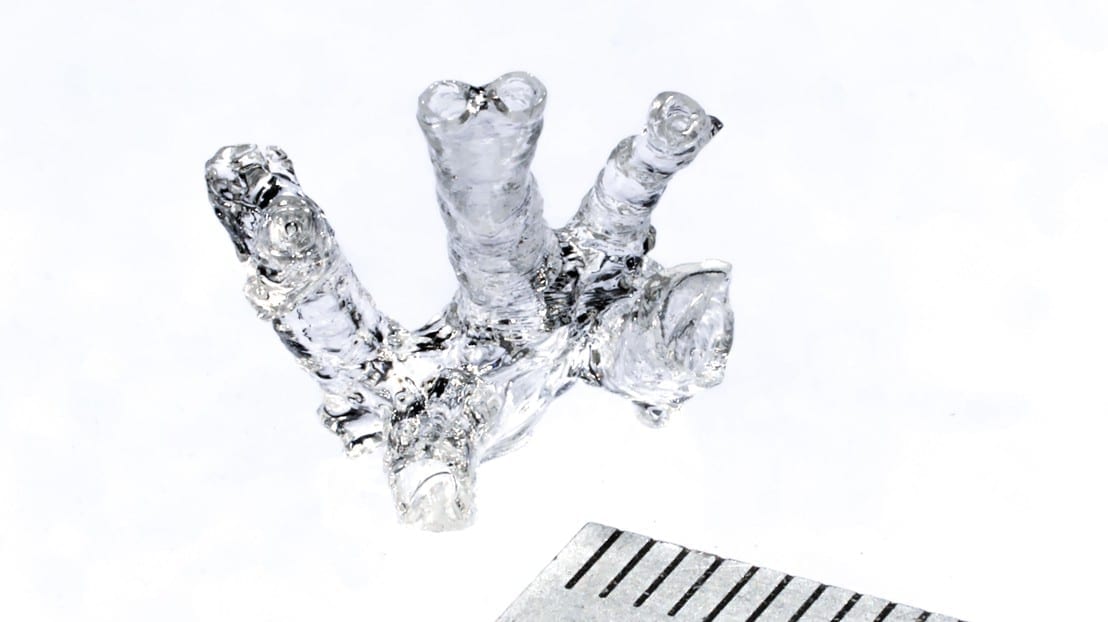
Credit: American Chemical Society
“Polyol-Silk Bioink Formulations as Two-Part Room-Temperature Curable Materials for 3D Printing”
Advances in 3-D printing have led to new ways to make bone and some other relatively simple body parts that can be implanted in patients. But finding an ideal bio-ink has stalled progress toward printing more complex tissues with versatile functions — tissues that can be loaded with pharmaceuticals, for example. Now scientists, reporting in the journal ACS Biomaterials Science & Engineering, have developed a silk-based ink that could open up new possibilities toward that goal.
Most inks currently being developed for 3-D printing are made of thermoplastics, silicones, collagen and gelatin or alginate. But there are limits to how these inks can be used. For example, the temperatures, pH changes and crosslinking methods that may be required to toughen some of these materials can damage cells or other biological components that researchers would want to add to the inks. Additives, such as cytokines and antibiotics, are useful for directing stem cell functions and controlling infections, respectively. To address these bio-ink limitations, David L. Kaplan and colleagues turned to silk protein and developed a way to avoid these harsh processing conditions.
The researchers combined silk proteins, which are biocompatible, and glycerol, a non-toxic sugar alcohol commonly found in food and pharmaceutical products. The resulting ink was clear, flexible, stable in water, and didn’t require any processing methods, such as high temperatures, that would limit its versatility. The researchers say the novel material could potentially be used in biomedical implants and tissue engineering.
Read more: Silk bio-ink could help advance tissue engineering with 3-D printers
The Latest on: Bio-ink
[google_news title=”” keyword=”Bio-ink” num_posts=”10″ blurb_length=”0″ show_thumb=”left”]
via Google News
The Latest on: Bio-ink
- A New Keith Haring Biography Leaves Out Half the Storyon May 1, 2024 at 2:45 pm
Radiant is a bountiful source of information about the late queer artist’s life and career, but it says oddly little about his art and its enduring legacy.
- Engineered living materials: Scientists 3D print with bio-ink made from tobacco cellson May 1, 2024 at 5:03 am
Also known as EPLMs, “engineered plant living materials” are a new frontier that marries synthetic biology and 3D printing, an invention that’s inspired many improvements to the mechanism itself as ...
- Novartis, PeptiDream Ink Potential $2.7B Deal to Expand Radioligand Discovery Partnershipon April 30, 2024 at 8:25 am
Under the latest teaming between the two companies, who have worked together since 2010, Novartis will pay $180 million upfront to PeptiDream to find new radioligand therapies.
- BMS, Repertoire Ink Potential $1.8B Deal to Find Vaccines for Autoimmune Diseaseson April 29, 2024 at 9:30 am
Bristol Myers Squibb’s deal announced Monday will see the pharma pay $65 million upfront to Repertoire Immune Medicines, which will develop autoimmune disease vaccines using its Decode discovery ...
- Repertoire, BMS ink $1.8B autoimmune disease discovery dealon April 28, 2024 at 5:00 pm
A week after Bristol Myers Squibb Co. disclosed a significant restructuring plan to focus on long-term growth drivers, the big pharma partnered with Repertoire Immune Medicines Inc. in an early stage, ...
- 3D Printed Silk Bio-Ink Shows Potential for Knee Meniscus Repairon April 24, 2024 at 7:00 am
Researchers have developed a silk-based bio-ink to 3D print a meniscus for better knee repair and regeneration.
- Biography of 102-year-old artist Lim Tze Peng wins richest Singapore book prize worth $30,000on April 23, 2024 at 8:02 am
Author Woon Tai Ho interviewed 103 people acquainted with the artist for the book. Read more at straitstimes.com.
- Evotec & Variant Bio ink partnership to discover and develop fibrosis treatmentson April 20, 2024 at 2:29 am
Evotec & Variant Bio ink partnership to discover and develop fibrosis treatments: Hamburg, Germany Saturday, April 20, 2024, 15:00 Hrs [IST] Evotec SE and Variant Bio, Inc. announ ...
- Scientists develop maleic acid-treated bacterial cellulose gel for enhancing bone repairon April 14, 2024 at 5:00 pm
In addition, the tightly entangled fibers within BC may pose challenges for its extrusion as a bio-ink during the printing process, which also limit the research that has been conducted on the ...
- World's First 3D-Printed Neural Tissue Grows And Functions Like a Human Brainon February 5, 2024 at 7:46 pm
Instead of the usual vertical layering, the team used horizontal layering of neurons derived from induced pluripotent stem cells, placed in a softer 'bio-ink' gel than in previous methods.
via Bing News










